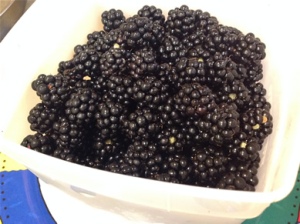Blue, blue my world is blue – the good kind of blue from the luscious blueberries (藍莓 lán méi) and blackberries (黑莓 hēi méi) in my yard begging to be picked. Duty-bound I don a white shirt with long sleeves, grab a 1 1/2 quart plastic container and head outside. It is my responsibility to unleash my gatherer instinct and free those anxious berries from their bondage to the same old bushes under the scorching sun.
What precision it takes to pluck each and every blackberry without being poked or scratched by the vicious thorns! And what delight it is to gently roll or rub a bunch of blueberries and nudge the ripe ones into the container! It does take some nerves, though, to work alongside the honeybees (蜜蜂 mìfēng) and not be intimidated by their constant buzzes and hums. My white shirt makes me basically invisible to these flying stingers. I just need to be careful not to pick from the same bunch the bees are after. Some of them zip around at lower elevations and bump into my long trousers once in a while.
An hour or so later, I come back inside with a quart of each kind of berries, fully intending to elevate their status to velvety berry sauces, to-die-for pies, or glistening jams and jellies. Alas, that is not to be. Eager hands fall upon the berries and plop them into eager mouths. Within minutes all berries are gone.
Oh well. Anyhow it’s too hot to be in the kitchen baking, canning or, for that matter, cooking. I stretch out on my favorite chair and dream about a vacation in Hawaii (夏威夷 xiàwēiyí). I imagine myself walking barefoot along the coastline, now and then picking up a seashell to admire. I come upon a group of adorable kids singing “Pearly Shells“. I smile and say, “Aloha!”
You might try singing the first part of this cute song in Chinese by substituting the English lyrics with the following lines.
小贝壳,来自海洋,
Xiǎo bèiké,láizì hǎiyáng,
Little shells that came from the ocean,
遍布沙滩上,
biànbù shātān shàng,
spread all over the sandy beach,
阳光下发亮.
yángguāng xià fāliàng.
glisten under the sunshine.
看见它们,
Kànjian tāmen,
Seeing them,
我心明白我爱的是你,
wǒ xīn míngbai wǒ ài de shì nǐ
my heart knows that the one I love is you,
尽管那些贝壳有多美丽.
jǐnguǎn nàxiē bèiké yǒu duō měilì.
despite the beauty of all the pearly shells.
来自 (láizì) means to come from a place. In “Learn Chinese through Songs and Rhymes“ we came across this word while singing the phrase “I come from Alabama” in the song “Oh Susanna”. We use this word more often in writing than in speaking. Colloquially you would say “The little shells came from the ocean.” as follows:
小贝壳是从海洋来的.
Xiǎo bèiké shì cóng hǎiyáng lái de.
明白 (míngbai) as an adjective means clear or obvious. Used as a verb, it means to know, to understand or to realize, as shown in the following example.
现在我明白了.
Xiànzài wǒ míngbai le.
Now I understand.
You probably already know that “I love you” in Chinese is 我爱你 (Wǒ ài nǐ). 我爱的是你 (Wǒ ài de shì nǐ) emphasizes the choice of the person one loves. You would use this form when there is a doubt of which person you actually love and clarification is called for. When you need to clarify your intention or what you’ve just said, you could start the sentence with 我的意思是 (Wǒ de yìsī shì I mean, or what I meant is)
尽管 (jǐnguǎn), as used here, means “even though” or “in spite of”. This word also means “feel free to (do something)”, as shown in the following example:
不要担心. 你尽管去做.
Bùyào dānxīn. Nǐ jǐnguǎn qù zuò.
Don’t worry. Go ahead and do it.
祝夏安!
Zhù xià ān!
Have a nice summer!

Recent Comments